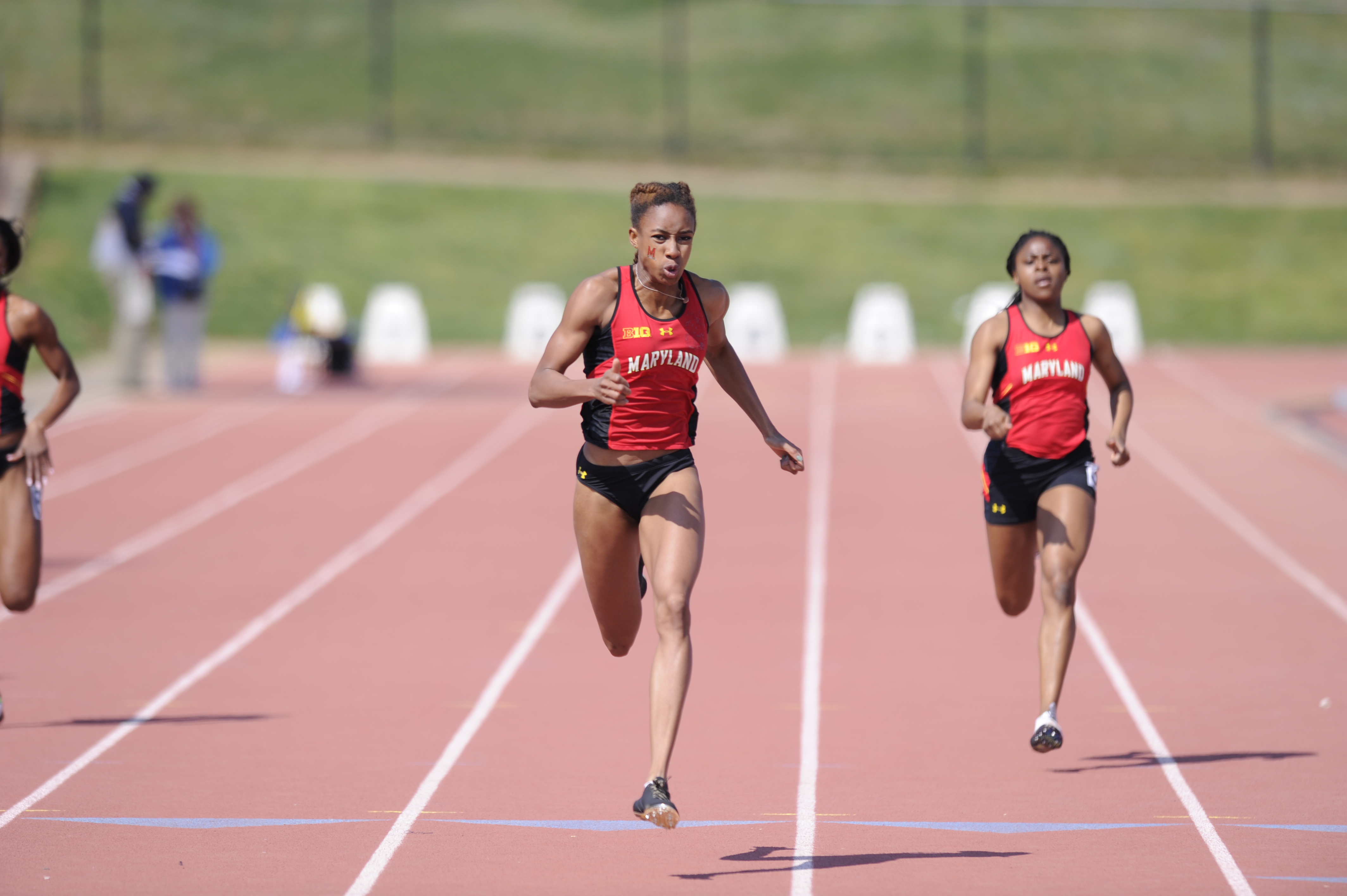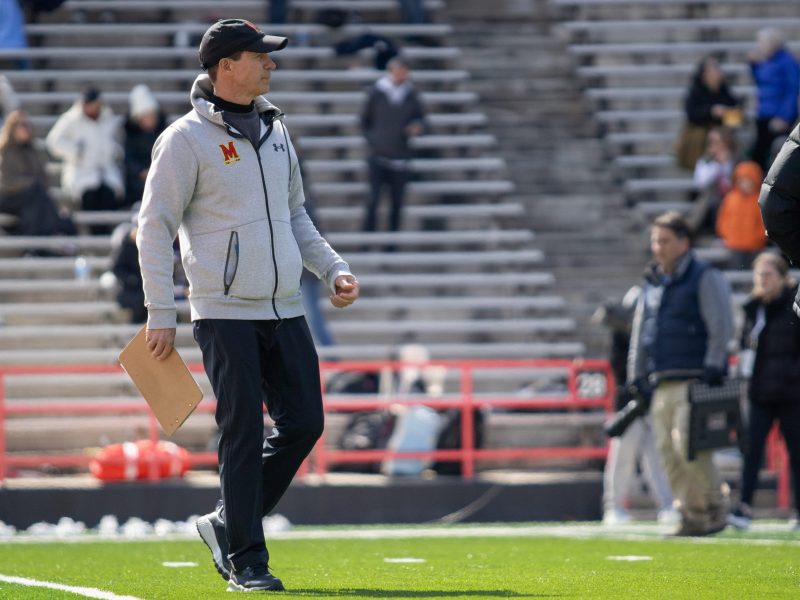Micha Powell, the daughter of two Olympians, has every reason to be cocky.
A devoted tennis player throughout her childhood, Powell didn’t participate in the sport her parents broke records in until her senior year of high school.
She started slow — running 59 seconds in the 400 meters — but not too slow to build a solid foundation. Within months she was blazing past her peers on the track and into the view of college coaches.
But Powell, now a standout on the Maryland track and field team, is far from arrogant.
Four days after breaking a 17-year program record with a 52.49 in the 400 at the Florida Relays, the junior, standing amid a lifeless Kehoe Track at Ludwig Field on a windy afternoon, couldn’t contain her glee before her first interview.
“This is so cool!” she said wide-eyed with a smile on April 6. “I’m so excited.”
Judging by her parents’ athletic accomplishments, Powell’s success on the track seemed preordained. Her father, Michael Powell, holds the long jump world record. Her mother, Rosey Edeh, is the Canadian record holder in the 400-meter hurdles.
Yet Powell’s parents never pushed the sport on her. When Powell finally found success running competitively, teammates expressed astonishment at her humbleness, a trait she’s maintained as her career progresses.
“It’s not like I’m riding on their coattails. I’ve ran all those 400s myself,” Powell said. “No one said ‘That’s Micha, that’s Michael Powell’s daughter, can you put her in a good lane?’ Never. It was always they can’t even pronounce my name right.”
In the years since the conclusion of his Olympic career, Michael Powell has established himself as a regarded long jump coach. He also spent time as the jumps coach at UCLA, as a consultant for the Los Angeles Dodgers and has worked with other Olympic athletes.
But he never considered offering tips to his daughter.
“I know from being a dad and also being a coach, it’s not really a good idea to coach your own kid, especially if you value your relationship,” Michael Powell said. “I never tried to force anything upon her. When you do that, they can go out there and be good in the sport, but they might not like it. … Let her do what she wants to do. If she finds it, she finds it.”
It was a calculated approach by the parents, who never lived together during Powell’s childhood.
Instead, Powell found the sport herself. After watching the 2012 Olympics with her mother on the huge flat screen television in their Toronto apartment, Powell felt compelled to take a stab at sprinting.
“I said ‘Oh my gosh, I could do that,'” Powell said.
So they ventured to the nearest track — a concrete path at North Toronto Collegiate Institute. Edeh, a three-time Olympian, watched her daughter, a track novice, try her hand at the 100 meters.
In the years to come, Powell would earn a scholarship, become an All-American and qualify for the NCAA championships. But there, at a shabby track in relative anonymity, she was just a high school kid trying something new.
She ran just under 14 seconds. For comparison, the Terps’ best outdoor 100 time in 2015 was a 12.25.
“My mom’s not going to tell me anything,” Powell said, “but she was like ‘Hey, want to try it?'”
Powell did. After all, she had started to grow tired of tennis, which she had played since the sixth grade. Attracted to the sport for the “performance element,” Powell said she was nationally ranked and hoped to play at the college level.
One of her biggest strengths was rushing the net, though sometimes she crashed into it when she moved too quickly.
“In tennis, coaches would ask me if I wanted to switch to track,” Powell said. “It’s good to rush the net, but I would literally fall into it. And of course, if you touch the net, that point’s done. I’d rush the net, and I’d literally have to stop myself since I got there so fast.”
As she grew older, Powell couldn’t deny her lack of fulfillment with tennis and felt inclined to try running.
So she joined the cross country team her senior year, and it wasn’t long before she developed a fondness for competitive racing.
“I loved the end of all my races,” Powell said. “I would just sprint. Everyone would be dying, and then I’d just explode.”
The next step was indoor club track. Competing with the University of Toronto Track Club, Powell quickly impressed her teammates in practice.
That’s why they were so surprised when Powell ran a 59 in her first 400. But they predicted Powell had a much brighter future.
By the start of the outdoor season, she had dropped her time to 57 seconds, which was enough to catch head coach Andrew Valmon’s attention.
“We recruited her knowing we had work to do,” Valmon said. “Felt comfortable knowing she had [the] tools necessary to develop.”
Valmon and the Terps were right. In addition to breaking the program record for the 400 at the Florida Relays in early April, Powell helped the sprint medley relay set a new Terps mark with a combined 3:54.92.
Through it all, she’s maintained her modest demeanor. Upon meeting new teammates, she doesn’t tell them about her famous father — though they eventually figure it out.
“Jewel Smith, she actually has him as her background on her phone,” Powell said of her teammate. “She came in not knowing I was going to be the daughter of their idol.”
As Powell told her story, the memories flooded out too quickly for her mouth to keep up. The entire time, she maintained a smile.
She knows the pressure will keep mounting as she continues to shave tenths of seconds off her time. Her name may get passed around throughout the track community, just like her parents’.
It’s already starting. Over the summer, she represented Canada at the NACAC Senior Championships, running the 400 in 53.73.
But Powell’s not thinking about any of that. She’s too busy enjoying herself.
“A lot of these girls I’m running against today, they’re all-time NCAA champions, they’ve been running since they were 6. And then there’s me,” Powell said. “Every time I step on the track I’m like ‘I don’t know what’s going to happen. I don’t know if this girl’s fast or not.’
“I’m just having fun with this.”



